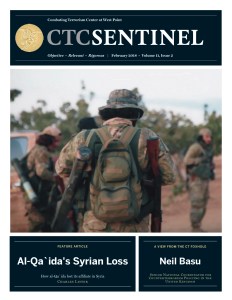From the Editor
The Combating Terrorism Center at West Point is proud to mark its 15th year anniversary this month. In this issue’s feature article, Charles Lister tells the inside story of how al-Qa`ida lost control of its Syrian affiliate, drawing on the public statements of several key protagonists as well as interviews with Islamist sources in Syria. In the summer of 2016, al-Qa`ida’s Syrian affiliate, Jabhat al-Nusra, announced it was uncoupling from al-Qa`ida and rebranding itself. Al-Qa`ida’s deputy leader at the time, Abu al-Khayr al-Masri, released a message endorsing the move, which even included a previously unheard audio clip of Ayman al-Zawahiri stressing that organizational links should be sacrificed if necessary for unity, creating the impression that al-Qa`ida’s paramount leader had also sanctioned the decision. What appeared to be a carefully choreographed set of announcements made many analysts conclude the split was nothing more than a PR exercise, designed to advance the local aims of al-Qa`ida in Syria by improving al-Nusra’s standing among Syrian rebel groups and insulating it from international pressure. But this interpretation was challenged by a bombshell message released by al-Zawahiri on November 28, 2017. Al-Qa`ida’s leader publicly revealed that not only had he not endorsed the split, but he regarded it as a “a violation of the covenant.”
“Al-Zawahiri’s interjection was a watershed moment,” Lister writes, “making clear to the wider global jihadi movement that a real split had taken place between al-Qa`ida and its Syrian affiliate.” One function of the split has been the beginnings of a tense modus vivendi between hardcore al-Qa`ida loyalists in Syria and Hayat Tahrir al-Sham (the latest rebrand of al-Nusra). The result, Lister argues, is “a complex counterterrorism threat, in which a locally focused jihadi outfit with a sizable 12,000 fighters continues to control territory, govern people, and maintain sources of local finance, while accepting—even grudgingly—a deeply dangerous, small, tight-knit clique of al-Qa`ida terrorists committed to attacking the West. That image looks eerily similar to the Taliban-al-Qa`ida relationship in Afghanistan in 2000-2001, the consequences of which are well known to all.”
Our interview this month is with Deputy Assistant Commissioner Neil Basu, the Senior National Coordinator for Counterterrorism Policing in the United Kingdom. Michael Horton examines the challenges faced by the UAE in its counterinsurgency campaign against al-Qa`ida in Yemen. Kendall Bianchi looks at how Hezbollah has used the mothers of fighters killed in Syria to promote martyrdom. Miles Hidalgo, one of the CTC’s Downing Scholars, provides a first-hand account of the cooperation between Europol and U.S. Homeland Security Investigations (HSI) at Europol’s headquarters in The Hague.
Paul Cruickshank, Editor in Chief
 Skip to content
Skip to content

